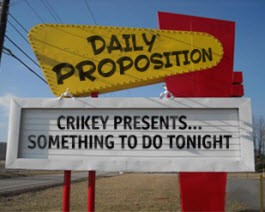I am going to read 20 classic, modern-classic or cult books in 2011.
All book-lovers have gaps in their reading — how could you possibly read everything? In recent years I’ve been fairly up-to-speed with newer books and Australian literature, but I’ll often find myself in conversation, saying “oh, I haven’t read such-and-such yet’”. People often assume I would have, given my “literary-minded” claims. I have to remind them I’m only 26.
I read Shakespeare in high school, plus gothic literature, Jane Austen and a few other things; through my undergrad and honours (in film and literature) I was introduced to Virginia Woolf, James Joyce, Franz Kafka, JP Donleavy, Italo Calvino, Thomas Mann, DH Lawrence, EM Forster, Anton Chekhov, and many other writers of the modern and postmodern eras. Since then I’ve obviously discovered a lot on my own, but there is much ground left to cover. I’ve decided that this year I’ll dedicate approximately a quarter to a third of my reading (20 books) to classic, modern-classic or cult books.
I’ve already compiled a list — books I’m curious about, books I think will be fun to read, books I want to be able to talk about, books I can learn from. They are from all different eras and genres. I won’t publish the list in full but after reading each one I will write about it and let you know what the next one or two are that I’m going to tackle. That way you can read along with me, or come back and comment on previous posts. Many of you would have already read the books and can jump straight into the conversation (not just on here but through Twitter and the Facebook fan page).
The first classics I’m reading are The Portrait of a Lady by Henry James and The Berlin Stories by Christopher Isherwood. I’ve never read either author. I became interested in Isherwood after seeing the film of A Single Man. My lovely Twitter followers led me in the direction of The Berlin Stories.
Have you set any reading goals for 2011? Will you be joining me in mine?








I’m not a great fiction reader but I’ve been working my way through William Burroughs for the last couple of years. Only two major novels to go.
With the end of this in sight, I’ve started on his British disciple JG Ballard, with “The Drowned World” and “Crash” under my belt so far. Next one “The Atrocity Exhibition”.
Main “bread and butter” is the British Sci Fi writer Stephen Baxter. Classic “hard” science fiction in the Arthur C Clarke mould – don’t read it for the characters or the literary style but to blow your mind with the concepts and breadth of vision. Sci Fi at its best can handle Really Big questions of human identity and direction in a way no other form of fiction can.
Yes, there’s so much more I’d like to read (Isherwood’s writings on Berlin among them) but as usual, too many interests, only one life!
Although I never took my own studies seriously, I’m grateful I was led into reading quality literature that students nowadays would never even hear about. In Infants School, although the first page of the first [red] reader had a single uninspiring sentence, “The cat sat on the mat”, and page two was little better being, from memory, “The cat saw a rat”, before we left 2nd class, our subsequent Infants readers [blue, green and brown] had introduced us to what nowadays might seem a staggering collection of material, ranging from Pandora’s Box through various other myths and legends up to the first story in the Brown Reader, about Grace Darling’s heroism.
In primary school I was encouraged to read a diverse collection of books including Wind in the Willows, Bury’s History of Ancient Greece, Colomb’s Great War of 189-, and numerous 19th Century classics which are effectively gone. Even though none of these books was set by the school, the teachers I had [none of whom was a graduate, but all of whom were more literate than are some latter day lecturers] together with a far more intellectually challenging curriculum than our unfortunate primary school students currently have, helped lead me down reading paths a working class lad (or lass) will never discover with our current curricula.
With less accommodating High School teachers (apart from the occasional one who perhaps knew what made me tick) I lost interest completely; but even so, there were some books e.g. “Selected Essays” by writers such as Addison, Steele and de Coverley, which presented Junior High students examples of well written material a tad more demanding than standard current pap. Perhaps not all students could handle it well; but whereas then not all students reached higher standards, nowadays all too many who could are never given that experience.
It saddens me, however, to know that so many students who could handle the challenge are instead off reading poor quality material. And I wasn’t even a serious student.